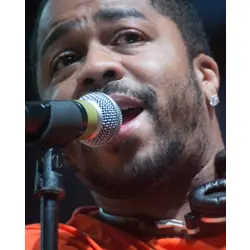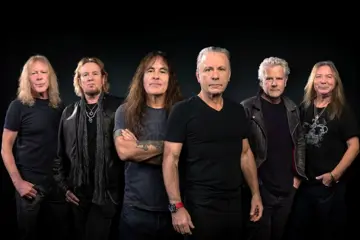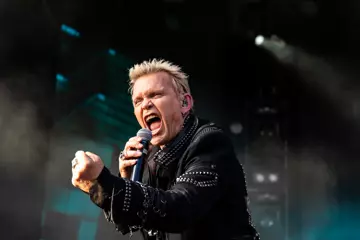 Just Blaze
Just BlazeThe Notorious BIG teamed with Puff Daddy and Ma$e for the oft-quoted '90s hit Mo Money Mo Problems. But in 2013 "mo fame, mo problems" may be the most apt catchphrase for urban music's megastars, who're more inclined to beef with the media than rivals or the underground's playa hatas. Fortunately, hip hop super-producer Just Blaze (AKA Justin Smith) has attained the fortune and achieved the fame without the drama. How? He's simply prioritised the music.
Smith, 35, is most often hailed as the co-architect of Jay-Z's career-resurrecting The Blueprint alongside Kanye West - although mainstream commentators give Yeezy the credit. Smith also produced tracks on Eminem's Recovery - like No Love, sampling Haddaway's Eurodance What Is Love and featuring Lil Wayne. Lately, he's hooked up with Baauer, of Harlem Shake infamy, and Hova again for the trappy Higher. While West fights off paparazzi, Smith freely jets around the world as a DJ. The Paterson, New Jersey native will be the main 'urban' name at the upcoming Listen Out "party". Smith has visited Australia previously - he even spoke at 2007's Red Bull Music Academy in Melbourne. But just this second Smith is cooking up some fresh shit in the studio. "It's sort of at the early stages of sounding good, but I'm not sure what I wanna do with it yet," he reveals.
It's unusual for a major hip hop/R&B producer to DJ at all. Dr Dre doesn't, headphone mogul or no. "I started out as a DJ," Smith says. "I've been DJing since I was a kid. DJing is pretty much the epicentre of everything that I do." DJing taught Smith about record-production. Now it helps him sharpen his instincts. "It's something that I don't do for the money. It's just something that I love to do. Hopefully, I do make good money doing it, but that's not the main focus. I feel like nowadays the DJing thing's so popular and, DJs being the new rock stars, there are a lot of people who are hopping on the bandwagon - I don't wanna say for the wrong reasons, but their reasons are just different from mine. This is a way for me to stay in touch with something that I love to do - and also it allows me to stay in touch with the people and see what they like."
In the '90s Smith was more about house than urban, but he'd cut beats for the likes of Ma$e's Harlem World plus acts on Jay-Z's Roc-A-Fella Records. Smith's big break came with The Blueprint - he helmed the pivotal Girls, Girls, Girls and Song Cry. The Blueprint was defined by its epic yet soulful old school samples - but it sounded modern. Mind, Smith never envisaged The Blueprint, which dropped on 9/11, being a classic. "You can love a record that you're working on, or love an album that you're working on, but, other than that, there's so many other factors that go into a record becoming a classic that aren't necessarily in your control," he says, citing the state of the world or the industry. "So, in retrospect, no, I didn't know that it was gonna become a seminal rap album. I just thought it was good - and I hoped that people thought it would be as good as I did!"
Don't miss a beat with our FREE daily newsletter
Of late the versatile beatmaker has ventured back into dance. Sure, Smith contributed Compton (featuring Dre) to Kendrick Lamar's good kid, mAAd city - but then he's co-produced that incongruous Baauer record. "I'm just a bit more comfortable letting people see other sides of me now," Smith proffers. "Not that I was uncomfortable with it before, but I just didn't have the outlet for it." Indeed, The Blueprint was almost an albatross. "I made my name in hip hop, so I had to do what I had to do to support that image." Smith's move into EDM is certainly not opportunistic or even about prevailing trends. After all, he produced "a straight-up Jersey house record" for Joe Budden in 2003's Fire (Yes, Yes Y'all). Still, Smith is bemused that some consider the electronic influence in urban to be recent. "I'm like, did you forget about a record called Planet Rock back in 1982?" Either way, Smith welcomes the fact that today's popular music is less segmented.
There have long been reports that Smith could present an 'artist' album himself - presumably rapping and producing - but he dismisses them as "Internet hearsay". "My asthma's too bad. I can't be jumping around on stage for two hours - I mean, I can, but not rapping. I can DJ on stage for six hours!" Smith has also let go of his company, Fort Knocks Entertainment, apparently set up at the instigation of Atlantic Records so he might "facilitate" the release of New York rapper Saigon's The Greatest Story Never Told (due to inertia at Atlantic, it eventually surfaced independently). "I'm at an age where I'm just enjoying making music and doing things that I love and being able to get paid for them - you know, make a good living, take care of myself and my family," Smith explains. "I'm not really looking to have the stress of having somebody else's livelihood right on my shoulders - 'cause ultimately when you run a record label, that's what the job is, you're responsible for somebody else's livelihood. I don't necessarily want that at this point - not right now."
Smith doesn't envy West's level of fame. "I couldn't live my life like that," he rues. "Don't get me wrong - I walk down the street, I still get recognised and I have to take pictures and things like that. But it's more so from a level of appreciation from fans, as opposed to paparazzi-types looking for their next scoop... I can still walk down the street and go grocery-shopping. I might have to take a picture along the way or say 'hi' to somebody or shake a couple of hands, but I'm not being scrutinised like that. To me, that's perfect because I don't think I'd be able to deal with paparazzi stalkers or just constantly being in the headlines!"















